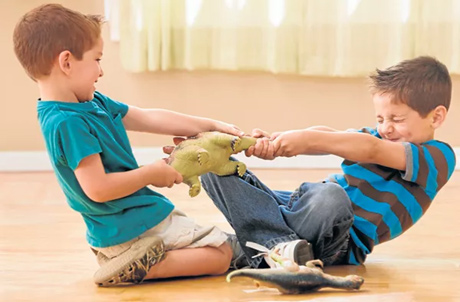
“You always sit next to mom! It’s my turn!”
“It’s not true, you sat with her yesterday.”
“That’s not fair! You always want to be the first!”
“It’s my toy, you can’t play with it!”
“But I want to play too!”
“No, leave it!”
Fights between younger siblings are a common and natural part of growing up and an almost universal experience in childhood. These conflicts, which affect more than 80% of school-age children, can worry parents, who are looking for ways to intervene and improve the relationship between their children. Through these disputes, children learn crucial skills such as negotiation, conflict resolution, and setting personal boundaries. However, it is essential for parents to understand the underlying causes of these fights, when and how to intervene appropriately, and what strategies they can implement to foster a harmonious relationship between their children.
Why do little siblings fight?
Sibling conflicts can arise for a number of reasons, including both emotional and situational factors. Some of the main causes are:
- Competition for attention: children have an innate need to be seen and valued by their parents. When they feel that one of their siblings is getting more attention, jealousy and resentment can arise, which often manifests themselves in fights.
- Jealousy and rivalry: jealousy is common between siblings, especially when they feel they must share the love and resources of their parents. Rivalry can intensify in situations where there is a noticeable difference in skills or achievements. If you want to know more about this cause you can visit the blog “Jealousy between brothers“.
- Temperament and personality differences: siblings, although raised in the same household, can have very different characteristics, which can lead to misunderstandings and conflicts. One child may believe that an action is very funny, however, the other may see it as annoying or irritating.
- Competition for toys and resources: ownership of toys is a common cause of conflict. Children may fight over who owns a specific toy, especially if it’s new or highly desired. The sense of belonging is strong in young children, and sharing can be a developing skill. In addition, they can also fight over the time of use of a toy, as taking turns can be challenging. Likewise, children tend to compare what they have with what their siblings have. If they perceive an inequality in the quantity or quality of toys and other resources, they may feel jealousy and resentment, which can lead to conflicts.
- Desire for independence: as children grow, they seek to establish their own identity and autonomy. This can lead to clashes when they try to assert their independence in the presence of their siblings.
- Imitation of behaviors: children often learn behaviors by observing others, including their siblings. If one sibling displays aggressive or competitive behaviors, the other is likely to mimic those behaviors, which can lead to a cycle of fighting.
Should parents intervene in conflicts between siblings?
One of the key aspects when acting in the face of conflicts will be to know the characteristics of them to know which conflicts we should intervene in and which ones not, since many times, the most appropriate thing will be for children to learn to resolve them without the help of adults. When faced with conflict between children, it is crucial to discern between “tolerable” and “intolerable” behaviors in order to determine whether we should intervene as adults or allow children to try to solve the problem on their own.
“Tolerable” behaviors:
In situations where children are arguing or have minor disagreements, it’s important to stay vigilant without intervening right away. Allowing children to try to resolve these conflicts on their own teaches them valuable negotiation and problem-solving skills. However, if the conflict seems to escalate during their interaction, it may be beneficial to step in as mediators to guide them toward a mutually acceptable solution.
“Intolerable” behaviors:
When conflicts involve physically aggressive or verbally abusive behaviors, direct intervention by adults is essential. In these cases, the first measure should be to physically separate the children to prevent any further harm. After ensuring their safety, it is crucial to divert their attention from the conflict to alternative activities that help them calm down and process their emotions more constructively and help them resolve the conflict more adaptively.
Should we hold the elder brother accountable?
A common tendency among parents is to hold the older sibling responsible for conflicts with younger siblings. This may be due to the perception that the older one must be more mature or have better skills to handle conflictive situations. However, this expectation can be unfair and counterproductive, as it can lead to resentment and feelings of injustice in the older sibling. When parents burden the older sibling with the responsibility of resolving or avoiding conflicts, they are unintentionally imposing pressure that can negatively affect their self-esteem and their relationship with their younger siblings. In addition, this dynamic can cause younger siblings to not develop the necessary skills to handle their own conflicts, since they always depend on the older one for problem solving.
To avoid blaming the older sibling, the following strategies can be used:
- Assess the situation objectively: it is essential that parents understand that both siblings can contribute to the conflict and that we should not automatically assume that the older one is responsible. Each situation must be evaluated impartially, considering the actions and emotions of all those involved.
- Encourage shared responsibility: teach all your children that each is responsible for their own actions and that conflict resolution is a skill they need to develop together. This helps build a more equitable dynamic and encourages teamwork.
- Provide equitable support: it is important for parents to offer guidance and support to both siblings without showing favoritism. Help them find fair and balanced solutions to foster a sense of fairness and justice in the family.
- Develop mediation skills: although it can be beneficial to teach mediation techniques to older children, this should be done as an empowering tool and not as a burden of responsibility. Parents should ensure that these skills are taught in a way that strengthens their children’s ability to handle conflict, without making them feel that their responsibility is to mediate fights.
How can fights be avoided and the relationship between siblings improved?
Improving sibling relationships and reducing conflict requires a proactive and conscious approach on the part of parents. Some of the most effective strategies are:
- Encourage time together and separately: it is essential for siblings to spend time together to strengthen their bond, but they also need individual time to explore personal interests and develop their identity.
- Recognize and validate feelings: validating each child’s feelings helps them feel understood and less inclined to seek attention through conflict. This contributes to more open and respectful communication between them.
- Promote cooperation instead of competition: involving them in collaborative activities and rewarding collaboration instead of competition can transform the dynamics of your relationship, fostering an environment of mutual support.
- Develop a conflict resolution system: teaching them specific skills for resolving conflicts, such as assertive communication and negotiation, empowers them to handle disagreements constructively and autonomously.
- Set clear rules and consequences: defining rules about acceptable behavior and applying consequences when these rules are broken helps children understand boundaries and maintain a safe and respectful family environment.
- Promote empathy and appreciation of differences: teaching them to understand and respect the feelings of others, as well as to celebrate individual differences, contributes to reducing rivalry and strengthening the sibling relationship.
- Reinforce positive behavior: recognizing and rewarding positive behavior between siblings, such as cooperation, kindness, and peaceful conflict resolution, reinforces these behaviors and fosters a more harmonious relationship.
In conclusion, fights between younger siblings are inevitable and are a natural part of their development. However, for parents, understanding the underlying causes of these conflicts and learning when and how to intervene are critical tools for managing these situations effectively. With the right strategies, they can not only mitigate fights, but also transform these challenges into opportunities for their children to develop valuable conflict resolution skills.
If as a parent you find yourself facing difficulties in managing fights between your children, we will be happy to offer you support and guidance to better understand the dynamics between siblings and provide you with effective strategies to manage conflicts.
Laura Maymó Gallurt
Psychologist Col. Nº B-03427






